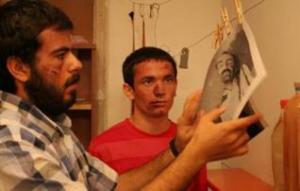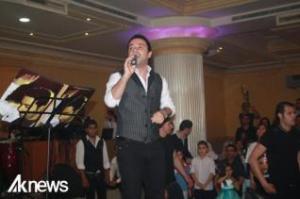
Kurdish Film Festival in London

LONDON, United Kingdom – More than 100 films about Kurds or by Kurdish filmmakers are being shown at the London Kurdish Film Festival this week.
In a statement, the festival’s organizing committee said their objective was “to support the development of Kurdish cinema... films made by Kurdish directors on any subject, and films of a feature, short and documentary style nature, on Kurds, by non-Kurdish directors.”
The festival includes 18 feature films, 30 documentaries and 55 short films that are being shown at the Picturehouse Hackney from November 17 to 24.
The first London Kurdish film festival was held in 2001. It has dramatically expanded over the past 10 years, screening many internationally recognized films produced in Kurdish regions and internationally.
The volunteer-run festival is supported by Kurdish community centers across London and is sponsored by several organizations including the Kurdistan Regional Government (KRG) and Kurdish media outlets.
The festival’s programmer, Mustafa Gundogdu, told Rudaw the event offers an opportunity for Kurdish films that would otherwise not have a chance to be shown to be screened for a diverse audience.
“We have a very strong program this year and we have managed to include films made by independent Kurdish filmmakers from all parts of Kurdistan... it’s a great opportunity for Kurdish filmmakers and Kurdish cinema as a whole.” He said.
In addition to films made in Kurdish areas, the festival includes films directed and produced by non-Kurdish filmmakers. The 2009 documentary The First Movie by Northern Ireland director Mark Cousins, who gave kids in Goptapa, a small Kurdish-Iraqi village, shows life through the eyes of children.
Several films produced in Iraqi Kurdistan and released by the KRG’s Ministry of Youth and Culture have also made it to the festival’s program this year.
Despite efforts by festival organizers to boost representation of Kurdish directors from the region, few Iraqi Kurds have been able to obtain travel visas. Iraqi Kurdish director Azad Kirkuki, whose feature film Freedom Seeking Kurds was screened at the previous festival, had been selected to be a jury member this year but is one of the many who cannot attend.
British-Kurdish director Havi Ibrahim said the festival “will be a great opportunity for Kurdish filmmakers to make connections and network with each other. At the last festival, I had an amazing time and met a lot of people from different parts of the world. We shared our experiences and we benefited a lot from this festival.”
Ibrahim said that prior to the festival, the unstable political situation in Kurdish areas made networking very difficult among Kurdish filmmakers.
“We all come from the different parts of Kurdistan -- which is entirely isolated and the Diaspora is massive -- but this festival broke all those boundaries. So I’m ready to go to meet new talent and new faces in Kurdish cinema,” he said.
Two of Ibrahim’s films, Wait and Hello Britannia, will be screened at the festival.
Wait is a documentary from Britain about the difficulties that asylum-seekers face when waiting for years to hear whether their applications have been accepted. Hello Britannia is a short film about asylum seekers illegally crossing the border between France to Britain.
The Yılmaz Güney Short Film Competition Award has been named after the influential Kurdish communist director, novelist, actor and revolutionary activist Yılmaz Güney, whose film Yol was the first by a Kurdish filmmaker to win the Palme d'Or at the 1982 Cannes Film Festival.
Twenty of the 55 short films are competing for the award, which will be presented at the Picturehouse Hackney on the final day of the festival, November 24.
- Add new comment
- 5122 reads


